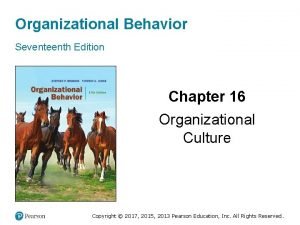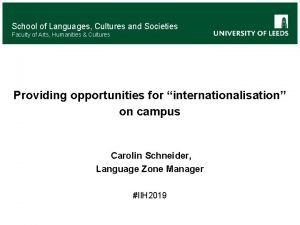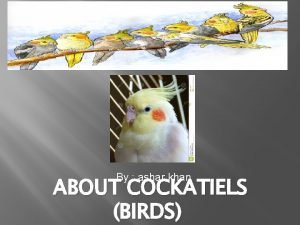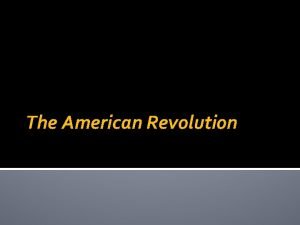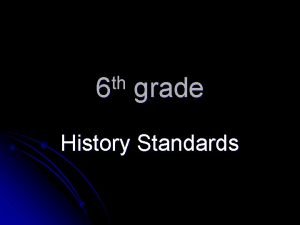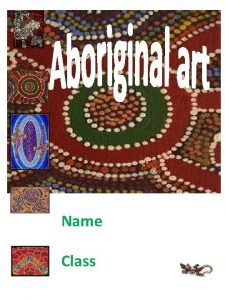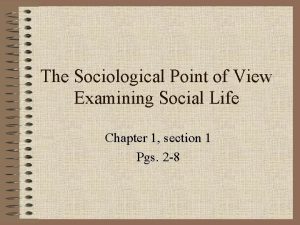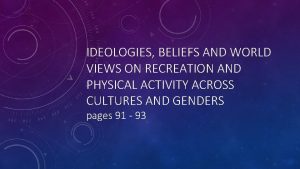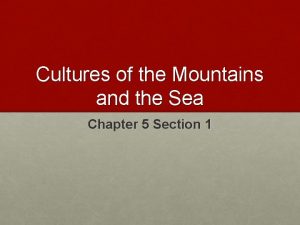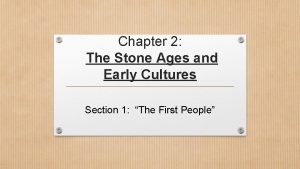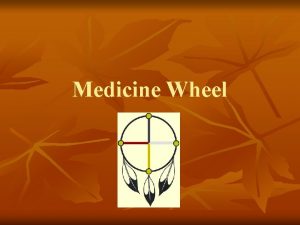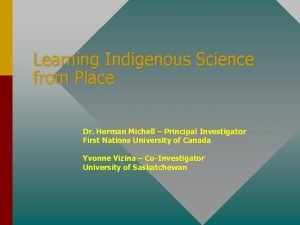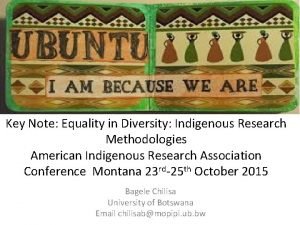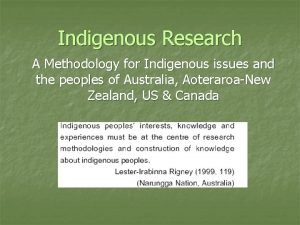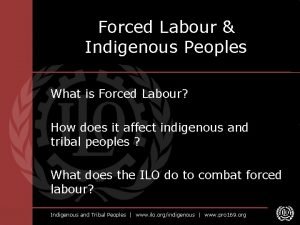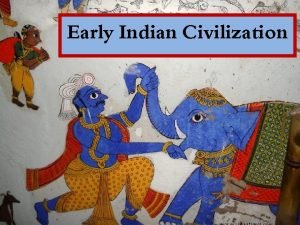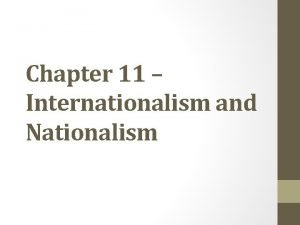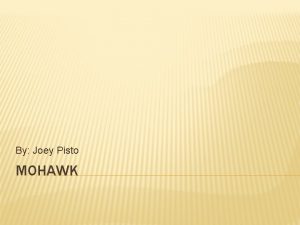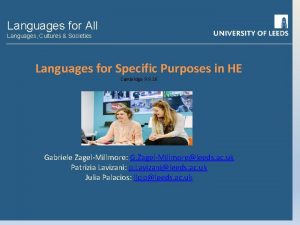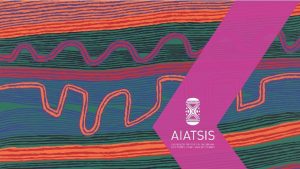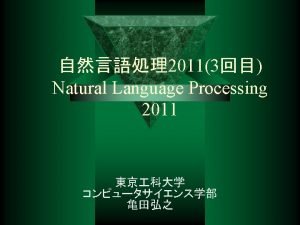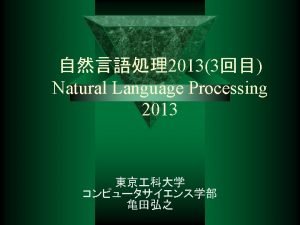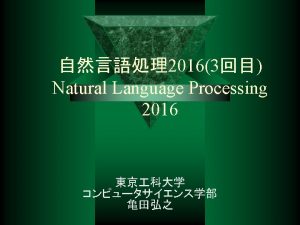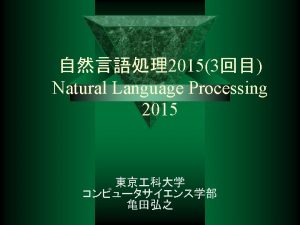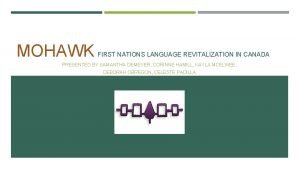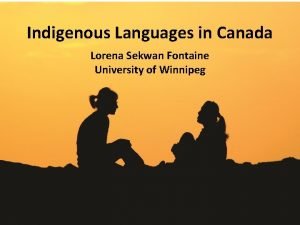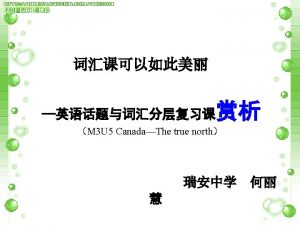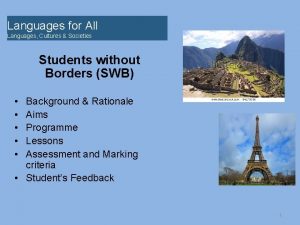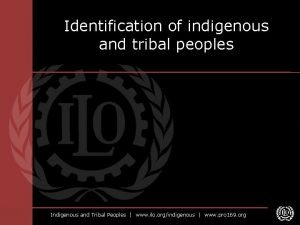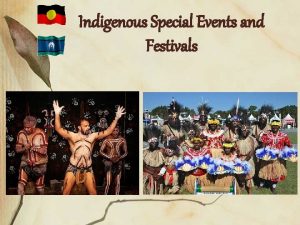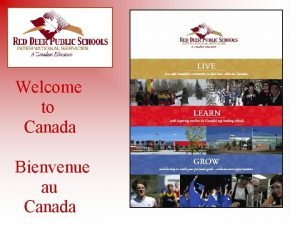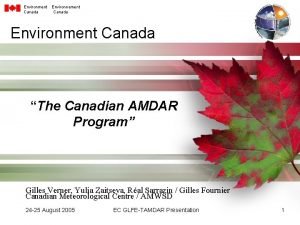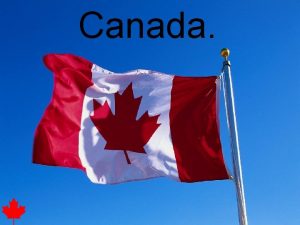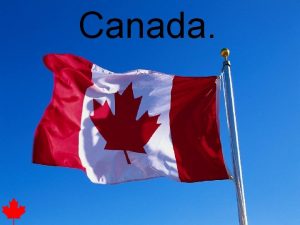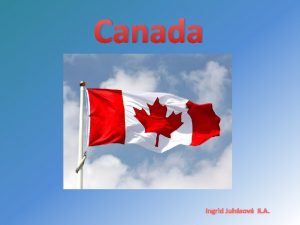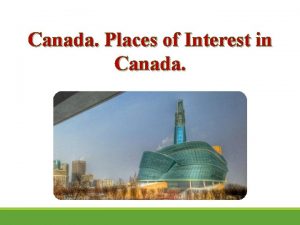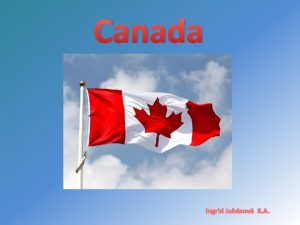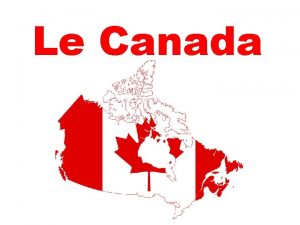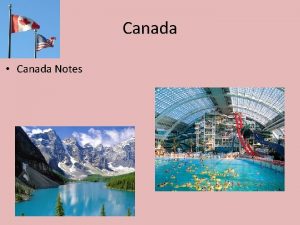INDIGENOUS LANGUAGES AND CULTURES IN CANADA Kontinonhstats Mohawk


























- Slides: 26

INDIGENOUS LANGUAGES AND CULTURES IN CANADA ©Kontinonhstats, Mohawk Language Custodians Association Project “Kanien’kéha Aionrón: ke” – Kanenna’kéne – Fall 2016 Generously supported by Canadian Heritage – Aboriginal Languages Initiative

Who Are Indigenous Peoples of the Americas? • INDIANS, First Nations, Native Americans, METIS, INUIT • WE HAVE OUR OWN NAME FOR OURSELVES AND OUR NATIONS – we call ourselves “Original People” or “Original human beings” – then by our collective name for ourselves – for example, Kanien’keha: ka – People of the Flint • The English call us Mohawks; the French called us Agniers.


Diversity in Language and Cultures • Each Indigenous Nation has their own language, culture, history, ceremonies, and Indigenous knowledge. • Indigenous knowledge is passed on to our children through our songs, legends, dances, ceremonies and the way we see and understand the land we live upon – our original homelands.

Diversity in Languages and Cultures • Our traditional teachings from our ancestors guide us on our roles and responsibilities to the self, our community, our Nation and to other nations. • Teachings in Indigenous languages tell us about the plants and medicines, how to identify them, how they are prepared and for what purpose – how to survive and thrive. • Our languages, cultures, ceremonies and histories are the foundations for our identities.

Today: Our languages and cultures … • There are over 60 Indigenous languages that are identified into 12 distinct language families according to Statistics Canada, 2011. • Statistics Canada reported there were 213, 400 Indigenous peoples who spoke their language at home – however Census 2006 reported 1. 3 million Aboriginal peoples. In 1996, UNESCO declared that “Canada’s Aboriginal languages are among the most endangered in the world. ”

The Crisis in Indigenous Languages in Canada – The Cause and the Cure Without a doubt, forced assimilation through government policies of colonization were and are the most devastating and prolonged assault on Indigenous languages, cultures, spirituality and traditional governing systems throughout the Americas.

The Cause: Discrimination via Linguistic Duality in Canada • Canada proclaims it is founded on two founding nations – English and French – obliterates Indigenous peoples. • Canada passed laws and regulations promoting only English and French throughout Canada. Section 23 of the Canadian Charter of Rights and Freedoms is the section of the Constitution of Canada that guarantees minority language educational rights to French-speaking communities outside Quebec, and, to a lesser extent, English-speaking minorities in Quebec. • There are no such protective laws to preserve, protect, revitalize and promote Indigenous languages in Canada.

THE CAUSE: Racism The first Prime Minister of Canada, Sir John A. Macdonald…believed it was necessary to separate Aboriginal children from their parents in residential schools. In 1883 he told the House of Commons, “When the school is on the reserve, the child lives with his parents who are savages; he is surrounded by savages, and though he may learn to read and write, his habits and training and mode of thought are Indian. He is simply a savage who can read and write. ” Library and Archives Canada, Harold Daly fonds, C-006513. Quoted in They Came for the Children, Interim Report, Truth and Reconciliation, 2011, p. 6.

Industrial and Residential Schools in Canada • Over 130 residential schools were located across Canada. The government-funded, church-run schools were set up to eliminate parental involvement in the intellectual, cultural, and spiritual development of Aboriginal children. • More than 150, 000 First Nations, Métis, and Inuit children were placed in these schools often against their parents' wishes. • Forbidden to speak their language, practice their own culture, learn their Nation’s history, the ongoing impact of residential schools has been felt throughout multiple generations and has contributed to social and economic problems that continue to exist. • Student labor contributed to the Industrial and residential school’s operation. Farming, carpentry, blacksmithing, sewing, etc. They paid for their own assimilation.

Cree School Boy – Before and After Residential School

Linguistic and Cultural Shaming & Indigenous Identity Confusion Cherokee artist, Jimmie Durham shared his views of how education resulted in doubting where you belong, he stated: They just pound enough bogus information into you to get you seriously confused about who you are, who your friends are, how the world really works, and what you can or should do about it. As long as you’re confused in those ways, you can never pose a threat to those who wield power over you, your people, your land, your future generations…That’s the purpose of the Indian education system in this country, and it always has been. Hell, those who run it have never cared whether Indians even finish the process, just as long as they’re sufficiently confused about everything that’s fundamental – and are therefore effectively useless to themselves and everyone else – before they leave.

Christianize and Civilize

THE CURE: Honoring our past - with our present & future

Canada’s Aboriginal languages are among the most endangered in the world – here’s why! Proportion of schools that offer Indigenous language immersion programming, by grade level Sample = 348 First Nation schools

Barriers to achieving Indigenous Language and Cultural revitalization WITH student achievement Ottawa is shortchanging First Nations schools in Alberta by $15 million a year compared with similar provincial schools, says a new joint study by provincial, federal and First Nations staff. By Elise Stolte, edmontonjournal. com June 3, 2012 SCHOOL FUNDING FOR LANGUAGES Provided from Aboriginal Affairs and Northern Development Canada (AANDC) – Funding formula developed in 1986, last updated in 1996 to adjust for population & living costs – Originally, the national funding formula allocated $215 per student to support languages, based on the salary of one language teacher for 200 students – estimated $15 million allocated for all on reserve schools in 2008 – In the province of Quebec, this amount is reduced to $185 per student

Barriers to achieving Indigenous Language and Cultural revitalization AND student achievement • Funding Inequities for opportunities to learn our languages in schools & communities – French & English minority education compared to First Nations education - • Example: Canadian Heritage being the largest department with $611. 0 M to support education in the language of the minority ($280. 0 M)*; support for second-language education ($190. 0 M); summer language bursaries ($40. 0 M); cultural development fund ($14. 0 M), among other initiatives. • Canadian Heritage - $3, 750, 000. project funding for First Nations - Aboriginal Languages Initiative = about $4. 77** for every First Nations individual – Innovation Fund – Projects involving technology

Federal Government Policies Undermining Indigenous Language & Cultural Revitalization Efforts AANDC STRATEGIC OUTCOME Program Activity Education K-12 Indian & Inuit CANADIAN HERITAGE STRATEGIC OUTCOME Alignment to Government of Canada Outcomes Program Activity Alignment to Government of Canada Outcomes A diverse society that promotes linguistic duality* and social inclusion Program Activity 5 Engagement and Community Participation 5. 3 Aboriginal Peoples’ Program Diverse society that promotes linguistic duality and social inclusion

Research: What works Strong Additive or Full Bilingualism/Biculturalism Program Type Child’s Language Status Language of Classroom Program Goals Indigenous Language and Culture Immersion Indigenous/ Minority Indigenous Language Indigenous language maintenance / revitalization; full bilingualism, biculturalism, Indigenous language biliteracy Indigenous Language and Culture Maintenance (Language Shelter) Indigenous / Minority Bilingual with emphasis on Indigenous language maintenance / Revitalization; full bilingualism, biculturalism, Indigenous language biliteracy Two-way Bilingual Dual Language Indigenous / Minority and majority (50/50; 60/40; 70/30, etc. ) Mixed Indigenous language / English or French ( 90/10; 50/50, etc. ) Indigenous language maintenance / Revitalization; bilingualism, biculturalism, Indigenous language biliteracy

Culturally Responsive Schooling Critical Elements 1. Use of the Native language as the language of instruction, either as a first or second language; 2. Pedagogies that stress traditional cultural practices and childadult interactions; 3. Pedagogies that simultaneously incorporate contemporary ways of knowing and learning; 4. Curriculum that emphasizes the importance of Native spirituality, placing this in contemporary contexts; 5. Strong Native community participation; and 6. Knowledge and use of community social and political mores.

Excellent Examples of CRS i. Puente de Hozho School, (Arizona) The Dine language is used as the language of daily instruction for Navajo students with English slowly introduced reaching an equal balance of instruction time in the middle years of Grades 4 -8. Navajo students in this school exceed the performance levels of their peers in monolingual English programs in the state on standardized tests. ii. Nawahiokalani opu’u Laboratory School (Hawaii) A Hawaiian immersion school offering a seamless program from early learning to secondary school. The goal is to offer academic programs of excellence in the context of Hawaiian language and culture. Evaluations of student achievement reveal over time that these students surpass their peers in non-immersion schools on standardized tests in English.

Excellent Examples of CRS iii. Onion Lake, Saskatchewan Gift of Language and Culture - Starting in September 2003, the Onion Lake First Nation, the Lac La Ronge Indian Band, and the Peter Ballantyne Cree Nation joined together to provide a fully developed Immersion and Instructional First Nation Language Curriculum and resources to all First Nation Schools in Saskatchewan. iv. Akwesasne Freedom School Founded in 1979 by Mohawk parents concerned with the lack of cultural and linguistic services available in local public schools. As an independent elementary school, AFS has existed on a shoestring budget for over 25 years. In 1985, the parents who administer the school made a historic decision to adopt a total Mohawk immersion curriculum. It was a historic decision. AFS was the first to implement this curriculum and did so without approval or funding from state, federal or provincial governments. By focusing on our young people, we reverse the assimilation process and ensure that the Mohawk people do not lose their language, culture and identity. v. Kahnawake Kanien’kéha Ratiwennahní: rats: Adult Immersion Program – has their own community language law. They also have several immersion and bilingual programs.

Language Revitalization Needs: • Immersion Programs – The most successful method of creating more speakers and increasing fluency of semispeakers by providing them with opportunities to be immersed in the language through daily and traditional cultural activities. • Pre-School Language Nests – Immersion pre-school for very young children and parents. • Master-Apprentice Programs – One-on-one immersion program for learners committed to becoming fluent by intensively working with a fluent speaker – often with the intent of becoming a language teacher.

Language Revitalization Needs: • Language and Culture Immersion Camps – Opportunities for fluent speakers to pass on their language and culture to younger generations through traditional cultural activities. • Training and Certification – Developing programs for training and certifying language teachers and resource people in the community. • Documenting the Language – Recording, documenting & preserving • Developing Resource Materials – Curricula materials to increase languages use and proficiency • Archiving – Language archiving using technology.

Language Revitalization Also Needs # 1 – COMMITMENT BY AND FROM: • Governments - formal recognition of Indigenous languages and cultures, with accompanying policy, with sustainable funding as provided for French & English minority education • Indigenous peoples • Individuals – participation in language/cultural activities • Communities – supportive programs & services that include authentic language & cultural activities • Leadership – consulting their citizens to develop and implement strong linguistic laws, policies • Our Nations – Indigenous languages first

The Gift of Language It is taken colonizing governments over a hundred years to shame and demoralize our people from speaking and passing on our precious language. We must take a stand say no more shaming! Or saying that we don’t need our language to get a job. We must all now promise our children and grandchildren that we will learn our language to the best of our ability. That we will not make any more excuses that we don’t have time. We only have about 60 fluent speakers left in Kanehsata: ke. We do have time – it is now.
 Characteristics of organizational culture
Characteristics of organizational culture School of languages cultures and societies
School of languages cultures and societies Why do cockatiels have mohawks
Why do cockatiels have mohawks Swampfox mohawk
Swampfox mohawk Mohawk accessible learning services
Mohawk accessible learning services Languages canada
Languages canada Aborignal symbols
Aborignal symbols What is sociology perspective
What is sociology perspective Recreational activities across cultures and genders
Recreational activities across cultures and genders Chapter 20:3 puncturing the skin to obtain capillary blood
Chapter 20:3 puncturing the skin to obtain capillary blood High restraint
High restraint Southeastern and gulf cultures
Southeastern and gulf cultures What impact did nearness to the sea have on greece
What impact did nearness to the sea have on greece Cultures and organizations software of the mind
Cultures and organizations software of the mind The stone ages and early cultures
The stone ages and early cultures Indigenous axiology
Indigenous axiology Medicine wheel color
Medicine wheel color Examples of indigenous science
Examples of indigenous science What is indigenous research
What is indigenous research Indigenous methodologies
Indigenous methodologies Indigenous knowledge systems tok
Indigenous knowledge systems tok Indigenous name for forced labour
Indigenous name for forced labour Indo-ayran
Indo-ayran World council of indigenous peoples
World council of indigenous peoples Colonization defenition
Colonization defenition Aboriginal simple machines
Aboriginal simple machines Denomination ap human geography
Denomination ap human geography
